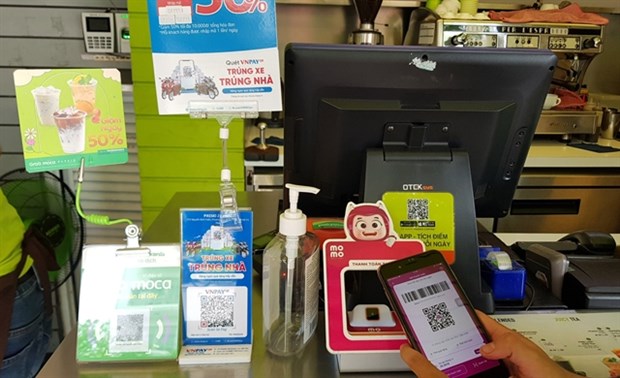PM asks central bank to study pilot implementation of cryptocurrency
- Top bitcoin exchange says over $30 million in cryptocurrencies stolen
- PM orders tighter control of Bitcoin, cryptocurrency
This was highlighted in the Prime Minister’s Decision No 942/QD-TTg about the e-Government development strategy towards a digital Government.
Cryptocurrency based on blockchain is among core technologies Vietnam hopes to develop and master, as well as artificial intelligence (AI), big data, augmented reality and virtual reality (AR/VR), which are expected to create significant breakthroughs as well as favourable conditions for building a digital Government.
 |
| The pilot implementation of cryptocurrency is being studied, which is expected to push up cashless payment and the formation of a digital Government. (Photo: thanhnien.vn) |
There are no specific definitions for cryptocurrency and virtual assets in Vietnam. For many years, the State Bank had stressed that cryptocurrencies, including Bitcoin, are not legally recognised in Vietnam and the use of cryptocurrencies as a means of payment is also not legally recognised and protected in the country.
The central bank asked credit institutions not to use cryptocurrencies as a type of currency or a means of payment.
To date, the central bank has not granted licences for any cryptocurrency trading platforms.
The Ministry of Finance set up a group to study virtual assets and cryptocurrencies under Decision No 664/QD-BTC dated April 24, 2020 to propose policies and management mechanisms.
According to Huynh Phuoc Nghia, deputy director of the Institute of Innovation under the University of Economics HCM City, it’s time for the Government to study and carry out pilot implementation for cryptocurrency. “Digital money is an inevitable trend.”
Currently, traditional currencies, including the US dollar, euro and yen, had greater influence on the world currency basket and international trade. However, in the race to develop and apply new technologies, there was chance for countries like Vietnam to rise and have a new influence on the global financial system.
The pilot implementation will help the Government find positive and negative aspects, if any, while developing a more appropriate management mechanism, Nghia said, adding that while cashless payments are ncreasing in Vietnam, the recognition of digital currencies by the central bank will help accelerate this process.
The study of cryptocurrency needs to be accelerated to gain advantages in the race, Le Dat Chi, deputy head of the university’s Finance Faculty, said. He cited a survey which found that central banks around the world are having three different responses to cryptocurrency. The first group, which includes 65-68 central banks, are piloting cryptocurrency use; the second is starting to develop a plan for pilot implementation; and the third group are still observing. Vietnam is moving from the third group to the second group.
However, there are risks to financial and monetary security, Chi said.
Nguyen Hoa Binh, Chairman of NextTech Group, said that it is necessary to have an official definition for cryptocurrency.
There are different words which might cause confusion, including virtual currency, digital currency, cryptocurrrency, electronic money and digital money.

